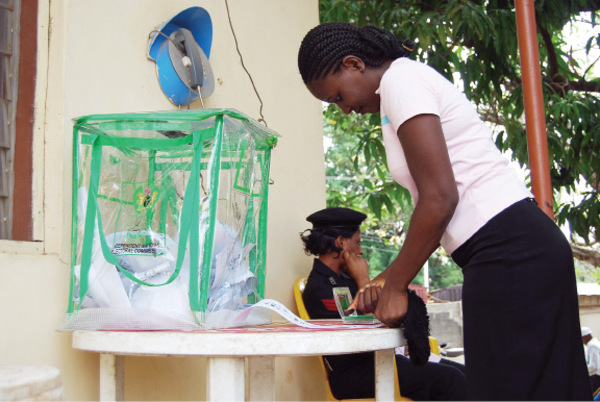There are quite a few reasons for having low voter turnout during elections. Some people simply do not want to vote, so they don’t. Others are undecided on who they want to vote for, so they do not choose anyone.
Other reasons are issues relating to voter registration, disenfranchisement of ex-offenders, voter disabilities, literacy, ballot and voter equipment, long lines and fixable poll procedures and many others that potential voters have reported.
Regardless of the reason for not voting, apathy on the part of the electorate often silences the voice of the majority and encourages the tyranny of the minority. By tyranny of the minority, I mean a situation where the majority of the minority who turned out to vote, elect a leader for the overwhelming majority who choose not to participate in the process of electing their leaders.
What could be the cause of the growing trend of voter apathy in elections across all level of governance? Most people believe that their votes don’t count! When voters believe that their votes really matter, they will naturally vote in larger numbers, without inducement or coercion.
Advertisement
This was evident in the annulled 1993 Presidential election won by Chief M.K.O. Abiola of blessed memory. It will be recalled that for the first time in our political history, Nigerians from all walks of life threw away party affiliations, religion, ethnicity and cultural differences to elect a leader in a free, fair and transparent election.
Many people believe that poor voter turnout is a reflection of the dissatisfaction with our voting system. The process is too cumbersome and it serves as a disincentive to a lot of people who cannot sacrifice by making out time to register and collect their voter cards. A citizen without a voter card will be a spectator while others are queuing up behind candidate(s) of their choice on election day.
Nigerians perennially endure amendments of our Electoral Act by the national assembly to “fix” our electoral politics with a view to making it conform to standards elsewhere. Citizens are not left out too, as there have been growing calls for the inclusion of the ever-popular Diaspora voting, Internet voting, proportional representation and mandatory voting. These sorts of proposals are simply remedial window dressing. What Nigerians need, first and foremost, is a vote that actually works for them and for our democracy.
Advertisement
Instead of allowing ourselves to be diverted with incidentals, let us focus on implementing an electoral system that really listens to Nigerian voters and creates “representation” true to the meaning and spirit of the word. Our ballots must capture the full measure of diversity in our political thought and be counted in such a way that that diverse voice is represented in each election cycle from the parliamentary, gubernatorial and presidential elections.
Until we do this, we cannot entertain proposals for secondary considerations such as Diaspora voting, mandatory voting and criminalisation of non-voting. How can we be talking of Diaspora voting when we have not being able to convince the local to fully exercise their right to universal adult suffrage? The need for such embellishments will be less pressing after the citizenry is empowered to truly participate in democracy. We will wonder why such a fuss was made in the first place!
It is really absurd when government has to use the carrot-and-stick approach to force the electorate to participate in the electoral process. Often times, they use carrots by declaring public holidays for electorate to register and collect their permanent voter cards. The stick comes in diverse ways, like civil servants being asked to present their voter cards before they are paid salary for the month. You can get more results with honey than with vinegar.
Forcing people to vote, and fining them for not doing so, is appealing to many in society and government. But it will not work. Libertarians will argue that being forced into anything smacks of a “police state” mentality and is morally wrong.
Advertisement
Still on the stick for those who fail to participate in the electoral process because of inherent voter apathy, I could go further by proposing that the authority suspend all their voting rights for political elections at any level whatsoever during the next election cycle. This is because of the hurt I feel whenever I witness voter apathy during an election. People who don’t realise that voting is a responsibility and privilege that many in the world are willing to die for should have all their rights taken away from them. It is unthinkable that almost half the population doesn’t give a damn about who governs them and what they do in office.
However, the minute you take those voting rights away, they will become valuable and, in the ensuing battles to regain their right to vote, many non-voters may become better-informed. They may realis–e that government decisions at any level eventually affect their own daily lives one way or another.
The moral burden here is that forced voting basically goes against the idea of democracy. Democracy allows freedom, so freedom to decline from voting is an inherited right. Given the despondency of most Nigerians, especially the ill-informed, we would be better off as a society if only 25 per cent of educated, knowledgeable people voted during elections. If a potential voter cannot name the three main political parties or two of the candidates running in an election, possibly they should not be voting because at the end of the day, head or tail, it is certainly guaranteed that they would be unable to make an informed choice.
As politicians realise that the voters today are becoming less and less knowledgeable about the issues, political parties have become lethargic and deficient in ideology. They simply resort to simple catch phrases to hoodwink the people and win elections. To be honest, a smart politician today says next to nothing in terms of blueprints and vision to uplift the people because that means their opponents have nothing they can make stick to them.
Advertisement
We would all like to see more voter participation in our democratic process, because with our numbers we can hold our elected leaders accountable and insist that they redeem all their campaign promises.
So how do we get more people to vote? The political parties themselves are mainly the reason. Don’t make promises you know you can’t deliver just to try and get more votes. Don’t spend all your time and money on saying how bad the other parties are. Don’t bother telling us what you wouldn’t do; tell us what you will do when voted into office so that we know what to hold you to task on.
Advertisement
If our political leaders started acting more like adults and not like children, we might become more engaged. If the national assembly could amend the Electoral Act and institute a properly representative electoral system and make voter inducement by way of “stomach infrastructure” a criminal offence, there would be no need for political parties to resort to jungle tactics characterised by intense competition and struggle to outdo one another in sharing “stomach infrastructure” to the electorate. Rather. they will focus more on their manifesto and what they intend to do to empower the people if voted into office. When a ruling party is rejected by a majority of participating electorate on account of dismal performance in office, the opposition, if given the chance, will sit up.
This brings us to the issue of mandatory voting and making it a criminal act for anyone to refuse to vote. Some people have absolutely no interest in politics; others form political opinions on the shallowest of facts; and still others are very badly informed. To give one example, an educated woman I know recently told me, “I don’t vote because all politicians are crooks.” Honestly, I would object strongly if she was to vote and her vote held equal weight as mine.
Advertisement
No doubt we have a problem with low voter turnout during elections, as obvious from the majority of the minority emerging as winners in recent elections conducted in the country. Let us try to get to the bottom of the question of why people are not motivated enough to vote. Just requiring people to vote is not a helpful solution to improved civic involvement.
We have a lot of other ways to address low voter turnout before making it a criminal act not to vote. First is by adopting a voting system in which every vote counts, so everyone actually has a reason to vote.
Advertisement
Secondly, we need to ramp up civic education and engagement opportunities. We could have voter-designed leaders’ debates in more regions and on key issues. Voters could pick the issues and submit the questions, with real-time online voter reactions during debates. We could lower the voting age so that high school students are introduced to real-life democratic engagement and voting through civics classes. And so on.
Mandatory voting at this point is just covering up the problem, not addressing the root causes. I am otherwise not in favour of compulsory voting as a considered abstention should be a valid stand. However, in the context of recent electoral shenanigans, that is a very good point.
Soni Akoji a pharmacist and social media critic,wrote in from Abuja
Add a comment







